Touring A Fractured State

March 2017 | Photos by April Wong
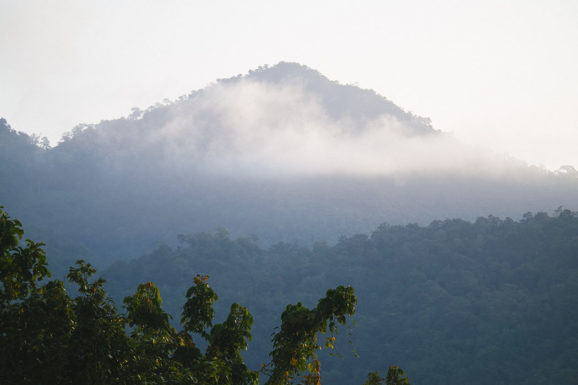
The ceremony began before 7 a.m. at the spirit house, built near the base of a massive shade tree. Jo Daw, 52, rubbed two grooved pieces of bamboo together to ignite coconut-husk kindling for a cook fire. Outside, the jungle air of Myanmar’s Karen State was warm and sticky, and a thin sheen of mist enveloped the Dawna Range—a chain of granite mountains to the east. Jo Daw’s brother Po Noh, 40, and another villager, Po Kyaw Yuit, 55, heated honeycomb over the fire in their bare hands. When it was soft enough, they handed the wax to Jo Daw, who molded fresh candles along a string hung from the eaves of the bamboo roof. Jo Daw closed his eyes and began to chant, hoping to open a line of communication with the spirit world.
Jack Mu Pler, a former refugee and rebel soldier who was serving as my guide, turned to me and whispered, “His grandfather told his sister we were coming. She knew before we arrived last night.”
“Really,” I said. “His dead grandfather?” Jack nodded.
“Soon he will check the chicken bone to make sure we will be okay.”
I followed Jack’s gaze to two calm, unlucky chickens who hadn’t yet grasped their fate. Ours, though less fixed, was certainly troubled.
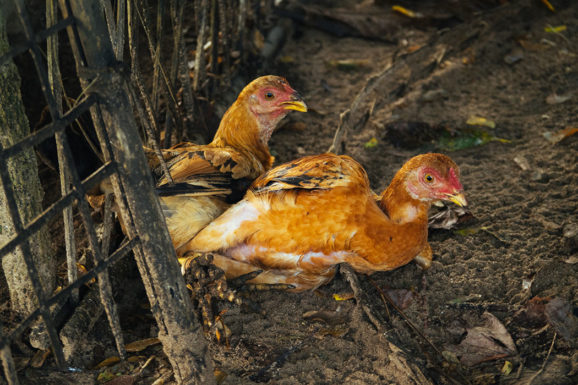
In the previous days, Jack had led me through the jungles of a long-disputed ethnic province that, until 2012, had seen active warfare for nearly 70 years. On the first day, we had nearly been trampled by a perturbed elephant. On the second, we lost our way in a dense thicket before nearly wandering into a live minefield. By the time we’d arrived in Thay Baw Htoo village, this business about the chicken bone and our fate did not sound so unreasonable.
Animistic rites predate Buddhism by centuries and are still alive in this part of Myanmar thanks to village tha mu, or shamans, who have learned the old ways. Jo Daw studied with his grandfather, the first of his family to build a house on this parcel, back when he was a cook for the British Army during World War II.
By 1944, thousands of British soldiers were camped on a nearby riverbank and remained there for more than a year, hiking into the mountains to root out the Japanese. One of them had planted the large shade tree. After the Japanese and British were gone, the rise of a military dictatorship in central Myanmar precipitated an independence movement in the region known as the Karen National Union. Over a period of 40 years, the country’s military killed and displaced tens of thousands of Karen people in order to tap the natural resources in the vast Karen State wilderness.
Jo Daw dipped a betel leaf into golden turmeric juice, which he’d poured into a coconut shell. He began chanting again, spraying the liquid in eight directions.
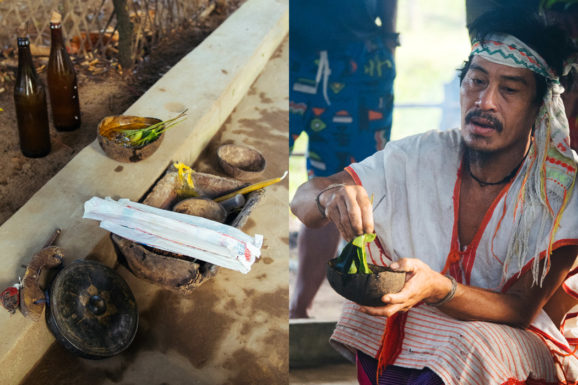
“He’s asking the spirits to come join with us,” Jack said, “so they may bless our journey and keep us safe.”
Jo Daw opened one of two bottles of home-brewed rice wine, poured it into another coconut shell, and swallowed it in one go. Then he offered me a double shot. Jack smiled as I gulped sweet morning fire. When Jo Daw’s chant resumed, I bowed my head.
I’d traversed Karen State before, sneaking over the border several times to report on the conflict and humanitarian abuses of Myanmar’s former military dictatorship in 2007 and again in 2011. Jack offered me my first opportunity to explore the terrain legally. His tourism venture, Unseen Myanmar, launched in January 2016. This was his fourth trip, and none had gone according to plan.
It was an auspicious time to go back. For the past four years, central Myanmar and its financial capital, Yangon, have boomed with corporate investments and new optimism. Whether or not any of that new money will seep into the backwaters of Karen State remains unclear, but peace brought at least the possibility of improvement in the rural population’s quality of life.
Before we’d ever considered petitioning the gods, Jack did some lobbying among his friends in the Karen National Union and its military arm, the Karen National Liberation Army, to win approval to visit this part of the territory, most of which remains closed to tourists. Despite ceasefires signed in 2012 and 2015, tensions between the KNU and the Myanmar government persist. Two weeks before we crossed the border, via Thailand, fighting erupted between two armed Karen factions, one aligned with the Myanmar military and the other an independent militia. Renewed violence sent thousands of villagers fleeing on foot near the capital city of Karen State, Hpa’an.
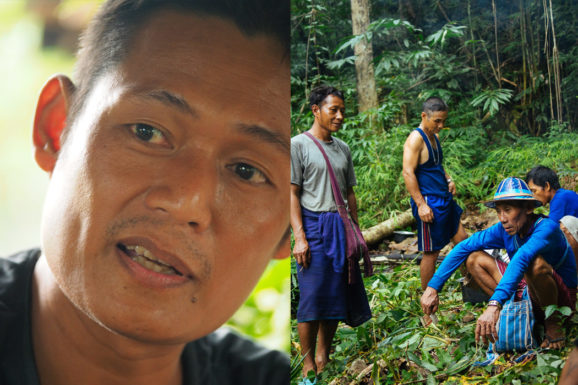
On our tour, Jack’s planned itinerary had to be scrapped as soon as we were lost in the jungle. Some of his previous guests had been put off by such abrupt changes, but they’re inevitable in an evolving state. Sometimes guides don’t show up for work. Transport breaks down. Mobile phones are plentiful, but the signal is patchy. Trails become overgrown after a few weeks of rain.
Jo Daw, Po Noh, and their families have no indoor plumbing, and use a small solar panel and a car battery for electricity, which are enough to power a light or two and a smartphone—their only access to the Web. Money is scarce. They grow rice and corn and raise chickens, pigs, and cattle, trading for the rest of what they need for meals. Most of the villagers in Karen State, except for those living closer to newly constructed roads, live similar lives.
Jack perseveres because sharing his country with guests is a kind of homecoming. Born in a village slightly bigger than Thay Baw Htoo, Jack was forced to flee with his family when the Myanmar Army invaded. He spent his early teenage years in the Mae La refugee camp in Thailand. At 16, he ran away to join the KNLA. After leaving the army, he worked as a pig farmer, founded an orphanage, and eventually married an Irish aid worker. After a brief stint working as a janitor at Facebook’s offices in Dublin, he brought his family back to the tropics and began contemplating tourism as a way to bring revenue and exposure to a place that had been isolated by years of violence. He hoped added revenue and interest could help make the war-torn land new again.
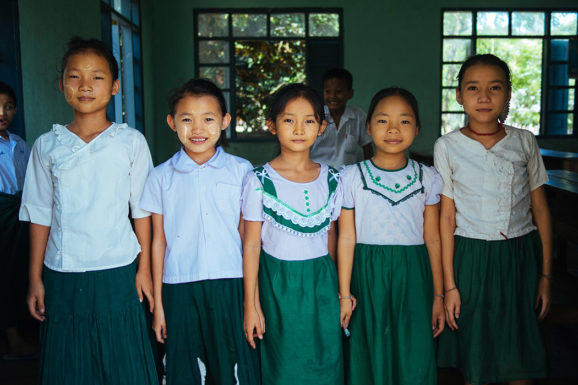
On our journey to Jo Daw’s, we passed iridescent rice fields, gold-domed pagodas, old teak churches, and schoolhouses filled with smiling children, but the language of war remained. Karen State is divided into regions called brigades, and we were touring the seventh. Even the mountain spirits were called “generals,” or thu khot in Karen. As we were consulting them, a summit meeting between four factions within the KNU was taking place in fifth brigade, near the Thai border, where leaders were hoping to fuse a fragile peace.
Knives aren’t allowed in the spirit house, so when it came time to sacrifice the chickens, Po Kyaw Yuit choked them, one in each hand. He placed them on the open fire until their feathers burned off, then roasted the skin a golden brown before cleaning them in the river.
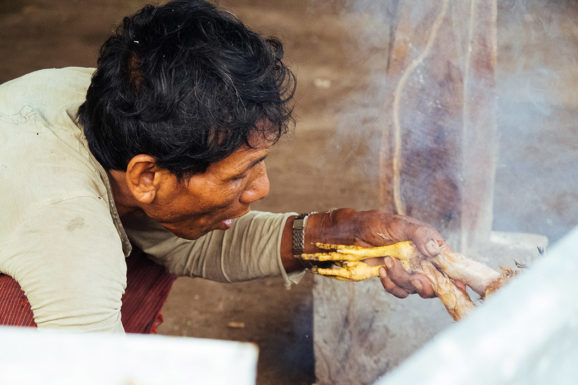
Jo Daw prepared eight offerings, each with a betel leaf, some chicken, and a candle, pouring and passing rice wine as the chicken cooked in an aromatic broth of turmeric, chili, garlic, onions, lemongrass, and wild greens.
Jo Daw read the bones, and the generals approved our journey.
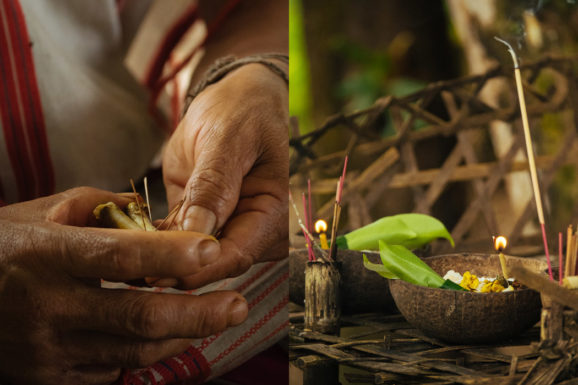
He led our party through miles of rice fields until we reached a village carved out of thick lowland jungle, where another group of smiling strangers welcomed us into yet another teak longhouse. We sipped coffee and watched their children play into the night, before falling asleep on the floor.
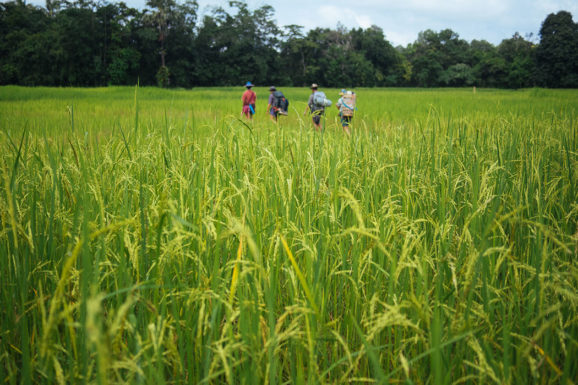
“When I bring you here,” Jack said, as we strolled barefoot the following day, “I feel like we have freedom.”